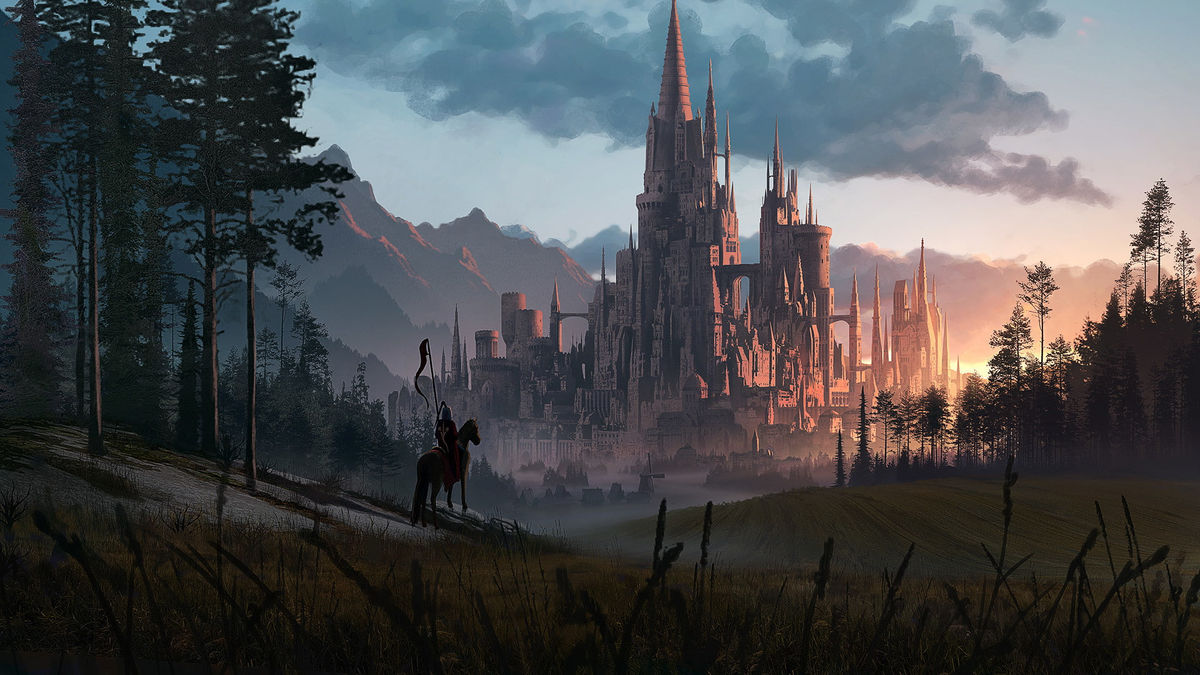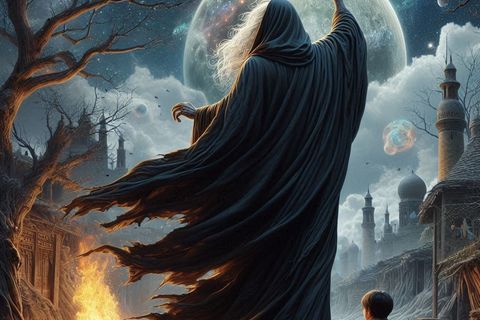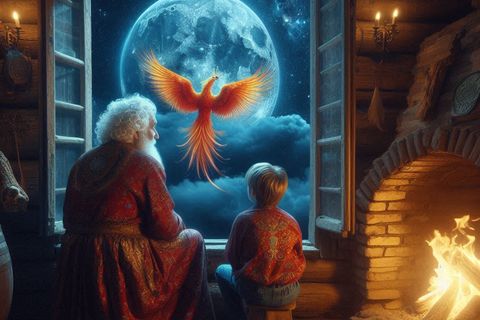Nemeses

The bells tolled Jaspar awake from curious dreams. The old man rose, ran his fingers through his white untamed beard, and reclined on an old wooden chair beside his desk. Across some crystal-like shards and pads laid on his lectern, Jaspar leaned forward to reach for some paper parchments, a quill, and an inkwell. Upon a breath let loose, he dipped his quill nib in ink and wrote:
Dear Clarissa,
The elders used to believe ravens were messengers. Those blackened birds whose cackles had awoken us upon numerous nights, would assemble in masses to warn our village as a choir of caws: ‘Hide!’. The world had changed much since the childhood I remember. The place where people were once adorned in heroic virtues and high hopes, had for decades been diminished. Some few elders remained who remembered the old world’s customs. Rumours were, some decades earlier, a close circle who later became known as ‘Old Order’, succeeded to convince our predecessors to abandon their families, homes, and societies to establish another. This secluded settlement which posed as an alternative to a macroworld, held promises in line with: ‘ancestral values and mother earth.’ This simple and impressive assurance alone was enough to bewitch our forefathers and foremothers to leave their worlds behind in pursuit of a pseudo-paradise. For some while, investments which came were vast and constructions quick. One elder once said that when the Grand Shrine was completed, Citadel’s medieval substructures and houses were devised to encircle the shrine.
Then, when Percival and Anastasia, our blacksmith and his wife remained absent from the fifth Yule Solstice, gossips and scandals soon spread like wildfire across our Citadel. Their disappearance led the locals to demand answers. Three days later, an answer was pinned on a central district pinboard which read: ‘Those who fail to witness his birth, shall not live to receive his mirth.’ Incredulous and dismayed, people rebelled, some demanded to leave, however, rules were clear, decrees long decided: none would enter nor leave Citadel. Enraged, all who opposed were hanged and burned without trials. Their charred corpses smelled like animal hides, somewhat sweet, somewhat sour, but overall vile. Ever since then, an execution would occur on occasion. Dwellers, young and old, were expected to crowd together to view the ‘Ceremonial Cleanse’. For idlers preoccupied with chores or otherwise, the ‘Secret Seers’ would be spread in cloaks to hide as moles within the crowds. Their homes were smeared in cow blood and names reported to the Clerical Council to be added to an endless execution list. Sometimes, any nimble neck would suffice for a rope to be wrapped around and hanged just to keep the herd at bay. In every corner, tall watchtowers were raised with caped men whose sole purpose was to watch us across each minute of each hour. This newly established band of brothers whose capes were embedded with a ‘Green Serpent’ emblem, would claim their mission was our protection from hazards both interior and exterior.
As the years passed and new normalcies replaced old ones, the world beyond our walls evolved more and more as an unreachable dream. In school, we were warned a new order had seized control all over, one which renounced our nature in exchange for a systematic evolution. This blend between man and machine had led many to don mechanic arms and legs, have chips implanted inside their scalps which allowed the blind to see, the deaf to hear, and as for others, to discover new unparalleled abilities. In due course, innumerable devices were assembled for the masses which served ulterior purposes beyond any individual’s needs. Likewise, we learned about an odd concept once known as organised religion which had divided masses for millenniums. Sure, we had a shrine; but ours was in homage to Sol Invictus, the old god whose light conquered darkness, or so we were told.
Today, I am older than most who live within this crooked Citadel. I have lived here all life and have no drive nor passion to chase diplomatic pursuits, so I avoid them to live in shadows. Our people wish to leave; but I cannot see any good come out of this. Some seven Springs back, a small posse who decided to escape were stripped and crucified. Their bodies became food for vultures. Our men and women will be pleased to learn about life outside these walls and accept the offer. But as for myself, I am sorry, dear lass, I cannot accept help. Our worlds are two diverse designs which cannot coexist. The status quo cannot change. We cannot further communicate.
Signed,
J. Cavalcade, Esq.
The old man stopped and placed his quill beside his inkwell. With crimson wax he sealed his letter, rolled it as a scroll, and looped a cord secure around it. From beside his attic window where a conspiracy of ravens perched in a hidden nest, the old man leaned and seized one messenger from behind grotesque gargoyles who stood guard. He twined his letter to its claw and, with some curious murmurs, released his feathered friend into the night. Outside, below, where shade veiled the bastion like a bedspread, lit torches were sprinkled in myriads as guards overseen with vanguards strolled in bands. The old man blew out the candle and resumed his rest.
When morning arrived, so did loud knocks on his attic door.
‘Esquire Jaspar Cavalcade?’ cried a hoarse voice from behind the garret door.
Unnerved, ‘Who disturbs me?’ Jaspar asked.
‘We’ve high orders to seize the old magi who dwells here.’ declared another voice, less hoarse, more civil, but as austere as the other.
Jaspar remained quiet, but the knocks grew louder and more rapid, ‘Esquire Cavalcade, unlock the door! You are to be incarcerated under claims of communication with exterior entities.’
The old man panicked. He raced to his window to see his ravens laid dead with arrows pierced through them. Someone knew, someone had spoken, someone he did not know, pondered the old man.
‘Esquire Cavalcade, this is the final warning, open the door or we’ll enforce entrance!’ warned the hoarse voiced guardsman.
‘That’ll be added expense he’ll owe to the Clericals.’ the more mellowed voice whispered to the other. But as silence persisted, the other walked back and within moments, landed a hard kick which smashed the door open. The old man was nowhere to be seen. The bed was made, bed bench closed locked, but on his desk, above which a harsh breeze billowed across the window’s cream curtains, laid curious square-shaped crystals which shone in variable colours. The two men lured closer and closer like moths to radiance.
‘What…are…those?’ questioned the scrawnier guardsman.
‘Sorcery!’ exclaimed the other. ‘The old philosopher meddles with witchcraft.’
‘He’s not here. Where could he be?’
‘Lord knows.’ the hencher man replied. ‘The sacrilegious sod has exercised in black magic!’.
‘We should sack the crystals, take them in for further orders,’ one exclaimed.
‘What about the old man, what’ll we to report to the commander?’
‘What can be said else truth? Tis’ clear the scholar has long escaped,’ he scraped his head. ‘Isn’t this where…those children were…?’
‘Come, we should head back. There’s an eerie air about this place.’
In a short while, the attic became cleared. From where the bed laid and prodded to one side, a trapdoor opened. The old man climbed out, dusted his hooded cloak from cobwebs, scouted the streets, and hurried his leave. Jaspar raced down the swirled stairs in speed. When he reached the door, he raised his hood up, and evaded his home to combine within a crowded avenue.
Upon cobbles where he walked, kiosks and stalls were spread all over where women and children sold merchandise in manifold: from fruits, herbs, and venison to skins, pelts, and furs. The men were busied with more burdensome labours across various vocations: smiths hammered irons, butchers cleaved hams and lambs, as bowyers fashioned bows and arrows: the same bows and arrows which supplied the same soldiers who suppressed the same people. Countless amblers and customers alike were spread all over, and an occasional loud barter could be overheard in heated exchange. The people, however, seldom seemed to look onto one another. There was an apprehensive unease which pervaded in all, one the old man had long been acquainted with. No two pair of eyes would lock onto another, unless for a split second or when some sale was made. No soldiers could be seen, but everyone knew how garrisoned guards would likely be stationed in abandoned toll houses like vermin hidden in walls. While Jaspar brushed past crowds he blended in, a strange sense came as though estranged eyes pried upon him. Regardless, he pursued on to the seashore.
When he reached the Inn by the Harbour, with some rhythmical knocks, the backdoor unlocked and soon opened. There stood a grizzled old man, older than Jaspar, who looked over his shoulders and, in some seconds, beckoned his visitor inside. The elder escorted him in silence across the inn to the storehouse, where behind piled wheat sacks, a trapdoor led the men to subterranean levels. After a short walk across a dark clandestine corridor, the two arrived at a broad busied hall where some two-dozen people were. As Jaspar entered, all chatters hushed, and eyes locked onto the old newcomer.
‘Maestro, what news?’ asked a lass sat beside the chessboard, midgame with another.
Jaspar looked onto her and in moments, ‘Her name is Clarissa, and she is curious to know much about our Citadel.’
The tall slim barkeep strolled over, ‘and what of the outside world?’ and handed him a wine filled silver tankard, ‘Will she help us evade this godforsaken place?’
Jaspar walked to the large round table in the centre and reclined on a chair as others mimicked him, also. ‘The world outside has evolved alien to the one we’ve come to know,’ and sipped from his tankard.
‘Tell us what you’ve learned.’ appealed another.
Jaspar released a solemn breath into his bewildered beard, downed his tankard to half, and began to enlighten his companions.
Across Citadel, what homes and abodes had amassed to encircle, was the Grand Shrine. Above an enormous simple shaped square construction, a golden sculpture which showed a man mid-sacrifice was placed. With a cloak which wavered still, he held his blade and slashed a bull’s neck. To his sides, two torchbearers and above them, a sun and moon. This marvellous monument which resembled rare workmanship from an antiquated age, held parables once widespread across the old world.
Inside, where druids in dozens wandered aimlessly, where candles burned in masses, and where silence festooned the corridors as mere whispered incantations could be heard, was a high cleric: Theodore von Hagen. Wrapped in a black silken cloak and busied behind his desk, his black hair draped down beside his handlebar moustache and onto the paper as he composed. While he moved his quill quickly to translate and inscribe liturgic lore from Latin, his black hound slept peacefully upon a crimson carpet beside him. When his chamber door was knocked upon, both Theodore and his hound grew vexed from the untimely interruption.
‘Who…disturbs…me…?!’ he bellowed.
After a brief hesitation, ‘Lord Theodore, we’ve returned from our commission…’
‘Inside,’ demanded the middle-aged cleric as he continued his work.
Two guardsmen — the same two who pursued Jaspar in his abode — entered and stood in silence to be called upon. Some moments passed before Theodore paused his inscriptions to look at the two until another word was spoken. He stopped, locked eyes with the bulkier man, then the thinner, and hence: ‘Well, where is he?’
‘He wasn’t in his house, sire.’ replied the slimmer man.
‘But we discovered these in his attic,’ continued the other as he stepped over and placed the sack on his desk.
Theodore pried his eyes on the sack and back at the men.
‘We believe the old scholar is involved in sorcery, milord.’
The cleric reached for the sack and examined its capricious coloured contents with an inquisitive glare.
‘What’ll we do now, master?’ asked one guardsman, but Theodore, quiet in his inspection, made no response. Some moments passed until the old man voiced a monosyllabic remark: ‘Leave.’
Within seconds, his chamber was cleared. From the sack, he drew a curious crystal pad and gazed mesmerised, as he rubbed his fingers around and observed without a blink. Moments later, with an accidental pressure of his thumb, the crystal glowed green, an unusual rhythm sounded and soon, a woman’s voice spoke from the device:
Jaspar,
I’d like to know more about the Citadel. We’d heard stories about it as children whenever we misbehaved. By the time we’d matured, Citadel had become a myth; an invented narrative made to scare little mischievous children. But for us who’d wish to know more, Citadel and other secluded settlements were mysterious places where people lived in harmony to human nature. But the paradoxes which you’ve revealed in your letter both surprises and scares us. You mentioned people had experienced convictions which led to executions and massacres; what happened? The people I am in association with are an able and well-connected people who can help. From what I’ve read, Citadel sounds like a place both utopian and dystopian. Your people understand cultures and customs we haven’t seen in centuries, like our ancestors once did. How did the Citadel come to be? I hope to hear from you soon, and what’s more, we hope we can help free those who still wish to leave.
Clarissa
Theodore’s clinched eyes widened to soon evolve as a scowl. ‘This…is a voxophone,’ he muttered under his breath as he laid the crystal pad aside to draw another: nothing; no sound; no colour. He drew one more which shone a red and blue hue. As he rubbed his fingers across, with near no effort, the crystal shone like a prism. But before any words were uttered, his chamber door knocked once more. Theodore placed the crystal back inside the sack and the sack behind his desk.
‘Enter.’
So entered a slender man clad in black and a cape which donned the green serpent’s emblem.
‘Speak, what say you?’
‘Milord, we have news on the conspirator. One of the Seers claims to have seen the old man enter the Inn by the Harbour.’
In sudden a smile summoned on his face as he raised to walk over to his spymaster, ‘Take me to where he’s held.’
‘He’s not yet been captured, milord.’
Theodore stopped. His smile disappeared like the sun behind clouds.
‘We’ve ravaged the entire inn, nobody’s seen the old magi.’
‘Either the innkeeper lies, or your spy does; which?’
‘They’ve both been seized and are under interrogation, milord.’
‘I see,’ the druid walked back to his chair and reclined once more. ‘Order your men to double in numbers until the magi has been seized; and spare no mercy on either men; I expect news by dawn.’
‘As you command, milord.’ responded his spymaster who soon vanished into the day.
Theodore placed the sack back on his desk, reached inside, and brought out all seven pads. Just one shone, the others, pellucid and clear like small dull crystals. The druid latched the prismatic one and began to listen.
By nightfall, Jaspar who had made his associates aware, had exposed a world which was beyond dreams or realisms, and news of the possible disruption of such a world. Ales and rums groaned in their bellies, but no louder than a mutual concern which screamed in silence.
‘What if she doesn’t receive the letter?’ asked Silas the pickpocket.
‘Time will answer us,’ the old man replied.
‘Time?! We have no time,’ expressed Ava, a healer whose herbs had saved quite some lives across the years. ‘Your ravens were killed, which means…’
But Theodore intruded, ‘…which means we’ll remain here until sunrise. Should the outsider make no response, then I’ll concoct a plan.’
‘And if she does…’
‘If she does, then we’ll have no means for concern.
‘The Green Serpents, Secret Seers, Clerical Council, how’re we to evade?’ asked another.
‘Patience people, please; and remember how I’ve stood beside you all across these years.’
No more questions came. The people, in divided corners where walls provided privacies, reclined on soft sacks as some laid to rest.
For an hour, as chatters and murmurs merged, Jaspar mused upon his childhood when he once lived in England, a nation no longer in existence. By mid-twenty-first century, a Third World War had emerged and ended to decentralise numerous nations across the world: Britain, France, Germany, Italy and more. He remembered a period when he dwelled with his grandmother in her old northern countryside cabin. His uncle who cultivated the surrounding lands, claimed his unique occupation to have been acquired as: ‘a pursuit for a noble trade passed down from his forefathers.’ With his father killed in war and his mother imprisoned, his grandmother, Tamina, had took it upon herself to raise Jaspar in her rural home. Upon some evenings as he perched beside her to watch the crimson sun set across deep blue horizons, she would voice him ideas and philosophies which she would claim were based on universal values. Though blind since her own childhood, Jaspar had come to consider his grandmother as an eagle-eyed woman whose wisdoms exceeded even those who could see. He recalled upon one specific eve as Tamina, laid on an old rocker chair, pointed towards two enormous trees poised in distance. Upon gold and green meadows which paved its rustic panorama, Jaspar looked to the trees where a river streamed in parallel. With a simple nod, he acknowledged her question in silence.
‘Describe them.’ she requested.
After some seconds, ‘Both are broad, immense, and old, but one is alive, and one is dead.’ Jaspar replied.
‘No, dear; both are quite alive. I can assure you.’
‘But…how can you...I mean...’ Jaspar paused.
‘How I see is unimportant, laddie,’ she interrupted, ‘What I see is what matters.’
‘What do you see, grandma?’
‘Why, I see the quintessence of us all, dearie,’ she replied, exposing a subtle smile.
Jaspar looked onto his grandmother in wonder and watched her blind white eyes gaze deep across the meadows. ‘But how can you? You’re... blind.’
The old woman sipped her cup and upon a breath let loose, ‘See laddie, people who bear wisdom and knowledge are like that vivacious tree: decorated in lush leaves and scrubs with fruits which weigh their branches low like humbled heads. But unwise and unknowledgeable people are like the tree you describe as dead: forever stood in hollow pride, are bare in branches, deprived, and fruitless.’
Jaspar opened his eyes. The hour had stroke past midnight and all his companions were asleep. The few candles which burned beside the bar were near burned out. The old man raised from his chair, strolled towards a corner, and laid to sleep for memories and dreams to combine once more.
‘Jaspar? Jaspar! Wake up,’ a nimble voice called him by name. Anahita, the neighbour’s daughter, and childhood companion who panted breathless, ‘Where is Lady Tamina?!’
The defence sirens sounded in loop, while Jaspar, as silent as stone, looked to his side to see his grandmother’s meadows set ablaze. Muffled speeches added to the symphony of sorrows. When he looked back, all had vanished, aside from his grandmother’s voice which echoed the words: ‘You will come back when the war is over.’
‘Maestro?’
The old man’s eyes opened once more. Silas, and some others had encircled him.
‘You’ve sweat like a boar, maestro,’ said one as the other raised his head to place a second sack underneath.
‘Are you…well?’ asked another.
Jaspar raised from his place and paced towards the corridor. ‘Have any ravens arrived?’ he questioned the doorkeeper, but no answer followed.
‘Maestro? What’s happened?’ but maestro ignored the question to repeat his own in vain.
The old man panicked and bellowed, ‘has the raven arrived?! Can someone answer?!’
‘No ravens, maestro.’ replied one watchman.
‘What’s happened, Jaspar?’ cried Ava who stood with a muddled look, ‘Speak!’
But Jaspar, panicked and bemused, ran over to the healer, placed his hands on her shoulders, and as he looked deep into her eyes, he said: ‘I will burn the Citadel.’
Silence followed. Then, ‘What say you, old man?’ asked one man from the hall.
‘Tonight! I will burn this cursed old Citadel. You will all be able to escape. Your children may even live to be raised in the outside world.’
Silence persisted once more. ‘And how’d you plan to do so?’ asked another.
‘Remain here until nightfall until I’ve returned,’ said the old man as he headed down the corridor, and once disappeared into the dark, he cried: ‘Ready yourselves!’
By nightfall, none could remember a day which had creeped as slow as the one passed. The men and women had assembled with small possessions, some with children, and chattered in whispers in case another eavesdropped and disrupted their plans. When some began to lose hope, voices began to be heard from the dark corridor. Some smiled in excitement while others seized their children’s hands and readied to leave. But as the voices drew closer and grew louder, guards and vanguards emerged from the dark. Readied to encounter the absconders, the guards unsheathed their swords and awaited command. However, as the bells began to sound untimely tolls, a curious sound emerged and with it, smoke began to rise which covered the hall in a cloud. Coughs, rasps, and wheezes followed, and soon, everyone had passed out unconscious.
Some time passed until people began to creep back into consciousness. They found themselves on a small ship, clothed as guards and vanguards, and their children, laid hidden beside the cargos. With each passing moment, more and more began to awake, and confused chatters resumed amongst them.
‘Old Jaspar’s stood by his word!’ one admired and praised.
‘Where is he?’ asked another, as the Citadel grew smaller and smaller with distance.
‘Has he not come?’ questioned Silas. ‘Well? Where’s the old man?’
‘He’s decided to stay,’ replied the healer as she raised her hand and pointed to the shores, where a man’s dim silhouette could be seen in distance.
‘I cannot understand, why would he…stay?’ Silas asked. ‘Why’s he not come with us?’ but no answer came.
Then, as the ship sailed more and more away, Ava expressed, ‘He’s lived in that crooked place since he arrived in childhood. He’s too old to adapt to life outside the walls.’
‘But he rescued us, for what? They’ll kill him when they discover what he’s done. What’ll be his win?’
Tears soon streamed down some’s eyes while others remained in sheer silence. As the ship sailed and the escapees gawked from afar to where the old magi’s silhouette faded in idleness, Ava replied under her breath: ‘…a sense of peace from all the lives he’ll have saved.’



